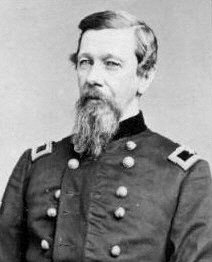Alfred Sully
| Alfred Sully | |
|---|---|

Brevet Brigadier General Alfred Sully
|
|
| Born |
May 22, 1820 Philadelphia, Pennsylvania |
| Died | April 27, 1879 (aged 58) Fort Vancouver, Washington Territory |
| Place of burial | Laurel Hill Cemetery, Philadelphia, Pennsylvania |
| Allegiance | United States of America |
| Service/branch |
United States Army Union Army |
| Years of service | 1841–1879 |
| Rank |
|
| Commands held |
CHRONOLOGICAL COMMANDS Indian War Commands: Seminole War, Florida Mexican-American War Western Indian Campaigns (N. California & S. Oregon) Northern Plains Indian Campaigns (Dakota & Nebraska Territories, Minnesota) Civil War Command: 1st Minnesota Volunteers, Virginia Peninsula Campaign Indian War Commands: North Western Indian Expeditions (Arapaho, Sioux, and Cheyenne) 1867–77 Chaired Investigatory Commissions on Indian Wars Nez Perce War Installation Command Commander, Fort Vancouver |
| Relations |
Son-in-law, Tipi Sapa (Black Lodge), a leader of the Yankton/Nakota band of the Great Sioux Nation Descendant, Vine Deloria, Jr. |
Alfred Sully (May 22, 1820 – April 27, 1879), was a military officer during the American Civil War and during the Indian Wars on the frontier. He was also a noted actor, having acted in the very same play as the one Lincoln went to see shortly before his death.
Sully was the son of the portrait painter, Thomas Sully, of Pennsylvania. Alfred Sully graduated from West Point in 1841. During and after the American Civil War, Sully served in the Plains States and was widely regarded as an Indian fighter. Sully, like his father, was a watercolorist and oil painter. Between 1849 and 1853, he became chief quartermaster of the U.S. troops at Monterey, California, after California came under American jurisdiction. Then, Sully created a number of watercolor and some oil paintings reflecting the social life of Monterey during that period.
Sully headed US troops out of Ft. Leavenworth, Kansas, in June 1861 as captain and occupied the city of St Joseph, Missouri, declaring martial law. Violent secessionist uprisings in the city during the early Civil War prompted Sully's occupation.
...
Wikipedia
